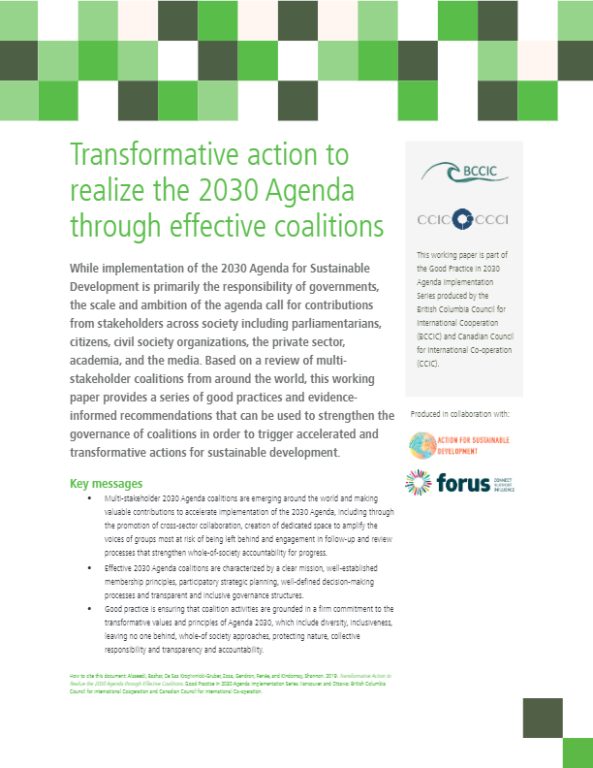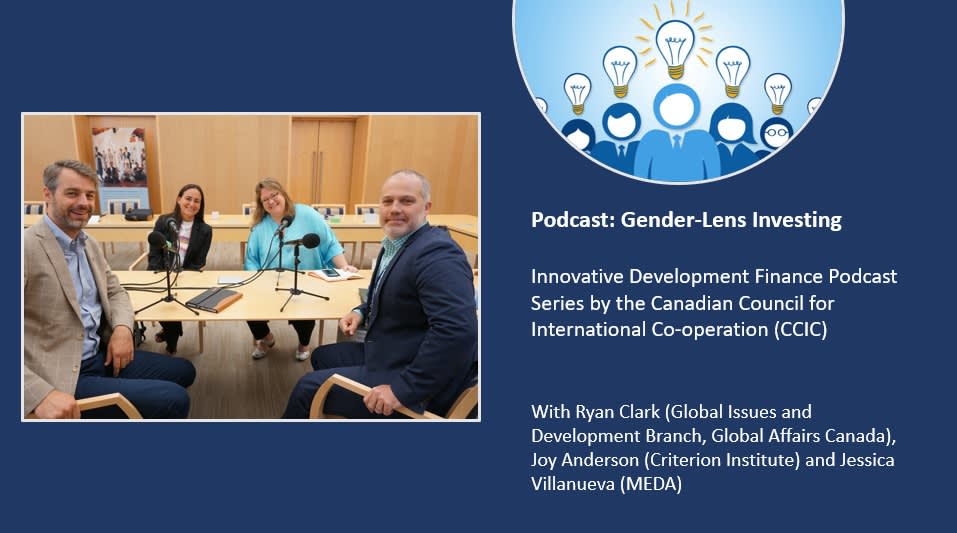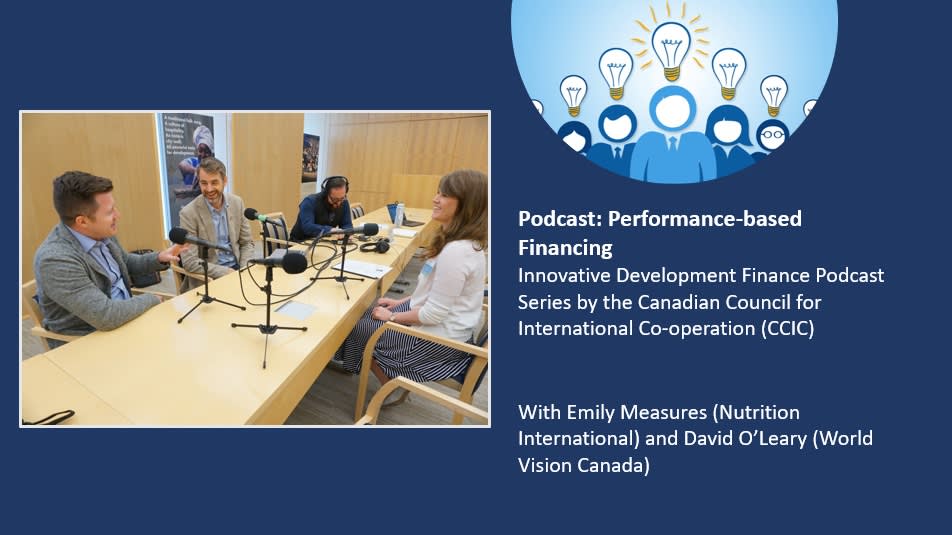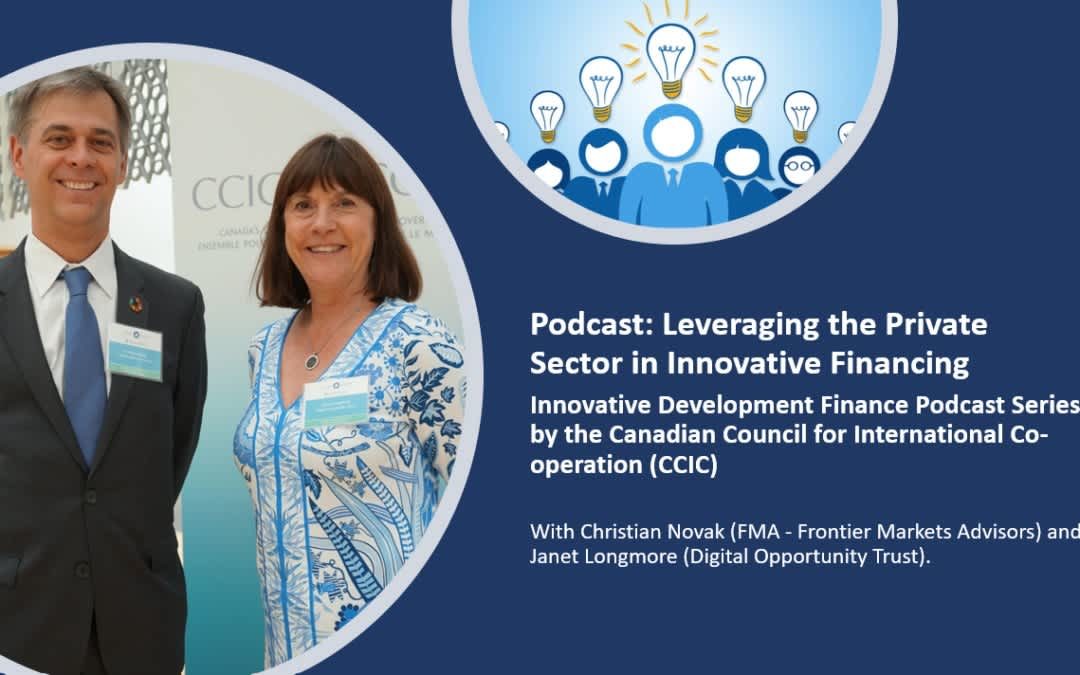Shannon Kindornay, Director of Research, Policy and Practice, Canadian Council for International Co-operation, and Laurel Wayne-Nixon, Lead SDG Policy Researcher, British Columbia Council for International Cooperation
On May 15, 2019, the Government of Canada closed its two-month consultation on Canada’s 2030 Agenda National Strategy. Along with 192 other countries, Canada committed to the United Nations 2030 Agenda for Sustainable Development in 2015 — a bold vision to realize progress for prosperous and inclusive societies and environmental sustainability for people and the planet. The 2030 Agenda includes an ambitious set of 17 Sustainable Development Goals and is grounded in human rights, gender equality, inclusivity, participation, planetary boundaries and efforts to leave no one behind.
Over March to May 2019, the British Columbia Council for International Cooperation and the Canadian Council for International Co-operation partnered to prepare a series of policy briefs on Good Practice in 2030 Agenda Implementation to inform Canada’s national strategy. Based on this work, and broader participation in the consultation on the strategy, there are four key elements we expect to see in Canada’s draft 2030 Agenda National Strategy, set for release ahead of the summer.
1) Guidance on all aspects of 2030 Agenda implementation
With only 11 years left on the agenda, the national strategy will need to spell out all aspects of implementation with a particular focus on where and how the government will accelerate action. This means that the strategy will need to move beyond describing sustainable development priorities to include plans to raise awareness on an ongoing basis, engage non-state actors and diverse communities, foster partnerships and build capacity for implementation, coordinate all levels of government and across sectors, localize implementation and monitor and evaluate progress. We expect the plan to detail who is responsible for what, how implementation will work through existing and new processes, and key milestones. In this context, we will be looking for how the Government of Canada plans to make a whole-of-society approach to implementation meaningful in practice, particularly for communities at risk of being left behind.
2) A plan to leave no one behind
Canada’s 2018 report to the United Nations on its progress in implementing the 2030 Agenda stressed efforts to leave no one behind. The 2030 Agenda is not about shifting averages. Its success is rooted in progress for everyone, everywhere and governments will be judged on their ability to target the furthest behind first. We expect the national strategy to outline who is being left behind in Canada and abroad, matched by a clear roadmap for how Canada will engage and support the empowerment and leadership of those identified.
3) A national plan for global leadership
We expect Canada’s 2030 Agenda National Strategy to outline how Canada will realize progress on sustainable development in Canada and abroad. The universality of the 2030 Agenda requires actions to address sustainable development challenges in Canada and globally such as climate change, financial stability and health pandemics that transcend borders. Leaving no one behind globally means focusing on those furthest behind in Canada’s efforts to support sustainable development in other countries. To support Canada’s global leadership, we expect Canada’s 2030 Agenda National Strategy to set an ambitious agenda for 2030 Agenda implementation in Canada and with respect to Canada’s global commitments, grounded in evidence, local priorities and whole-of-society approaches that work to leave no one behind.
4) A robust accountability system
The consultation included a focus on the Canadian Indicator Framework to monitor progress on the 2030 Agenda and transparency and accountability. We expect the national strategy to include a transparent commitment to report on progress in Canada and globally. Canada’s SDG data portal is already a good practice in terms of providing Canadians with the latest data on SDG implementation. A timetable for more comprehensive reporting at national and global levels is now needed. We also expect to see provisions to review the national strategy itself, for example in 2025 and 2030, with a focus on lessons learned, success factors, course correction and future efforts. Finally, Canada’s 2030 Agenda National Strategy should spell out how elected officials, people living in Canada and independent bodies, such as human rights councils, will be engaged to ensure overall accountability for 2030 Agenda implementation.
Canada’s 2030 Agenda National Strategy has significant potential to help push the needle on sustainable development in Canada and lay the groundwork for a more inclusive, prosperous, environmentally friendly and collaborative society. We, along with many others, are ready to contribute to Canada’s whole-of-society approach to leave no one behind.
This opinion piece is part of the Good Practice in 2030 Agenda Implementation Series produced by the British Columbia Council for International Cooperation and Canadian Council for International Co-operation and funded in part by the Government of Canada’s Sustainable Development Goals Program. The opinions and interpretations in this publication are those of the authors and do not necessarily reflect those of the Government of Canada.





